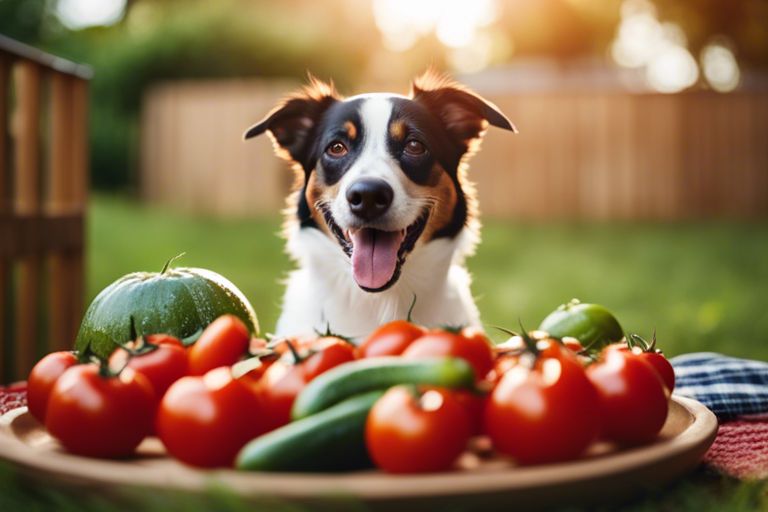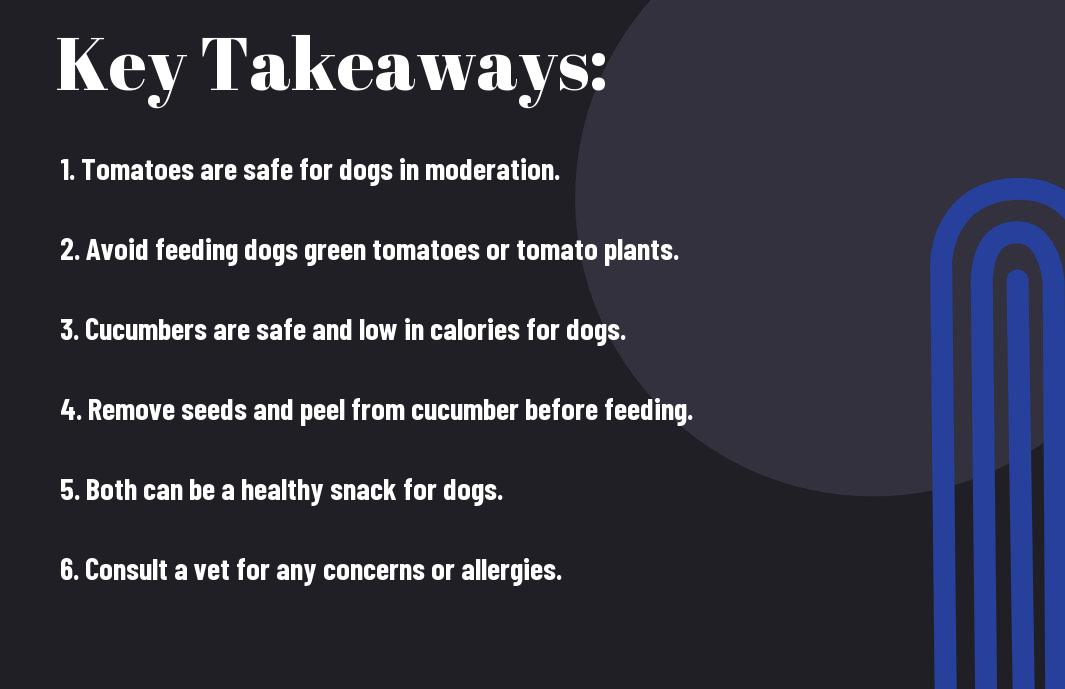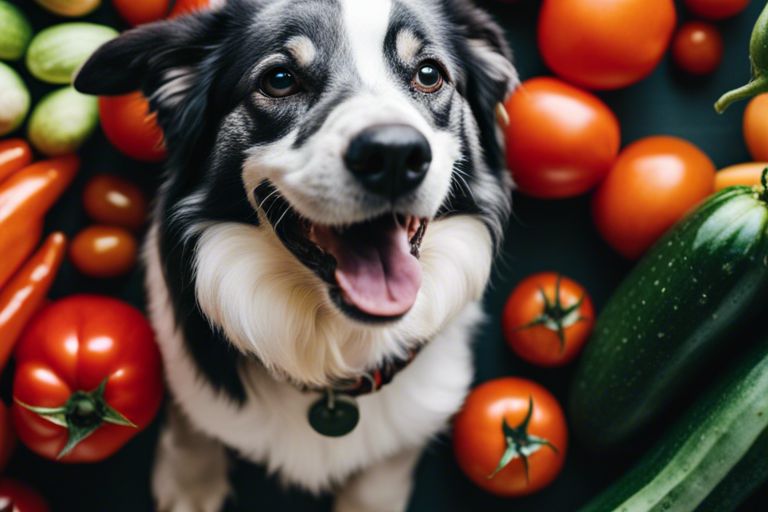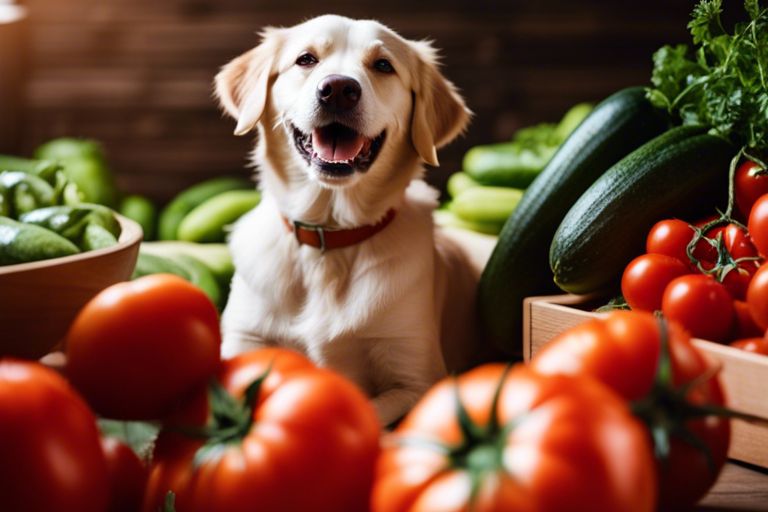Many dog owners wonder if their furry friends can enjoy a taste of tomatoes and cucumbers, just like you might. Regarding sharing these human snacks with your canine companion, it’s important to understand the potential risks and benefits involved. In this informative guide, we’ll explore whether tomatoes and cucumbers are safe for your dog to eat, and how to incorporate these fresh fruits into their diet in a healthy way.
Key Takeaways:
- Tomatoes: While ripe tomatoes are generally safe for dogs to eat in moderation, the green parts (stems, leaves, and unripe fruit) contain solanine, which can be toxic to dogs.
- Cucumbers: Cucumbers are safe for dogs to eat and can be a healthy snack option. They are low in calories and high in hydration, making them a refreshing treat for your furry friend.
- Modertion is key: Like with any human food, it is important to introduce tomatoes and cucumbers to your dog in moderation to avoid digestive issues. Always consult with your veterinarian before making significant changes to your dog’s diet.
The Basics of Canine Nutrition
Importance of a Balanced Diet
On your quest to ensure your furry friend lives a healthy and happy life, it is crucial to understand the importance of a balanced diet. Just like humans, dogs require a mix of vital nutrients to thrive. A balanced diet for your canine companion not only provides the necessary energy for their daily activities but also helps support their immune system, maintain a healthy weight, and promote overall well-being.
Common Food Groups for Dogs
To ensure your dog receives the nutrition they need, it’s vital to include a variety of food groups in their diet. The common food groups for dogs include protein sources, such as meat, fish, and eggs, which help build and repair tissues. Carbohydrates from sources like grains and vegetables provide energy, while fats aid in nutrient absorption and provide concentrated energy. Fruits and vegetables can also be beneficial, offering vitamins, minerals, and antioxidants to support your dog’s health.
Importance of incorporating a variety of food groups in your dog’s diet cannot be overstated. Each food group plays a unique role in supporting your canine companion’s overall health and well-being. By providing a balanced mix of proteins, carbohydrates, fats, fruits, and vegetables, you can help ensure that your dog receives the necessary nutrients to thrive.
Tomatoes: Friend or Foe?
You may have wondered whether tomatoes are safe for your canine companion to consume. Let’s explore the nutritional value and potential risks associated with feeding your dog tomatoes.
Nutritional Value of Tomatoes
Any dog owner wants to ensure their furry friend is receiving a balanced diet. Tomatoes are a good source of vitamins A, C, and K, as well as potassium and fiber. These nutrients can contribute to your dog’s overall health and well-being. However, it’s imperative to remember that tomatoes should only be given in moderation, as they should not replace a complete and balanced diet for your pet.
Potential Risks and Allergies
On the flip side, tomatoes also have some risks that dog owners should be aware of. The stems and leaves of the tomato plant contain solanine, which can be toxic to dogs if ingested in large quantities. While the ripe fruit of the tomato is generally considered safe for dogs, it’s imperative to avoid feeding them green tomatoes or any other parts of the plant to prevent any potential harm. Additionally, some dogs may have allergies to tomatoes, which can manifest as gastrointestinal upset or other allergic reactions.
Potential risks associated with feeding your dog tomatoes include gastrointestinal upset, such as vomiting or diarrhea if they consume them in large quantities. If you notice any unusual symptoms after giving your dog tomatoes, it’s best to consult with your veterinarian to determine the underlying cause and appropriate course of action.
Cucumbers: A Refreshing Snack?
Once again, if you’re considering incorporating cucumbers into your dog’s diet, it’s necessary to understand their nutritional benefits and potential drawbacks. For a comprehensive list of safe vegetables for dogs, you can check out The Best Vegetables Dogs Can Eat.
Low-Calorie and Hydrating Benefits
An excellent aspect of cucumbers as a snack for dogs is their low-calorie content and high water concentration, making them a refreshing and hydrating treat. This can be particularly beneficial during hot weather or after physical activity when your furry friend needs to stay cool and hydrated.
Possible Digestive Issues
With any new food introduced to your dog’s diet, there is always a risk of digestive issues. While cucumbers are generally safe for dogs, the seeds and skin can be harder to digest, potentially leading to stomach upset or gastrointestinal discomfort. Monitor your dog’s reaction when offering cucumbers for the first time, and consider peeling and deseeding them to reduce the likelihood of digestive issues.
Refreshing.
Can Dogs Eat Tomatoes and Cucumbers Together?
Synergistic Effects on Digestion
After exploring whether dogs can eat tomatoes and cucumbers individually, you might wonder if it’s safe for your furry friend to enjoy these two vegetables together. While both tomatoes and cucumbers are generally safe for dogs in moderation, combining them in your dog’s diet can have synergistic effects on digestion.
Effects of combining tomatoes and cucumbers can provide a good balance of fiber and hydration for your dog’s digestive system. The soluble fiber in cucumbers can aid in digestion and promote good gut health, while the antioxidants in tomatoes can support overall well-being and immune function in your canine companion.
Precautions for Mixing Vegetables
Digestion of different foods can vary among individual dogs, so it’s important to monitor how your dog responds to a new diet that includes tomatoes and cucumbers. While both vegetables are generally safe, some dogs may be sensitive to certain components in these vegetables. If you notice any signs of digestive upset such as diarrhea, vomiting, or gas, it’s best to consult your veterinarian and reconsider the combination of tomatoes and cucumbers in your dog’s meals.
Dogs have unique digestive systems, and while tomatoes and cucumbers are nutritious options for many dogs, it’s important to introduce new foods slowly and in moderation. By paying attention to your dog’s individual needs and reactions, you can determine whether combining tomatoes and cucumbers is a good choice for your furry companion.
Preparing Tomatoes and Cucumbers for Your Dog
Unlike humans, dogs cannot digest tomato leaves and stems or cucumbers with bitter skins. Therefore, it is necessary to prepare these fruits correctly before feeding them to your furry friend.
Safe Preparation Methods
The safest way to feed tomatoes and cucumbers to your dog is by removing the leaves, stems, and seeds. These parts can be difficult for your dog to digest and may cause gastrointestinal upset. It is best to chop the tomatoes and cucumbers into small, bite-sized pieces to prevent choking hazards.
Avoiding Toxic Compounds
Methods should avoid giving your dog moldy or spoiled tomatoes and cucumbers, as these can contain toxic compounds that are harmful to your pet’s health. Always ensure that the tomatoes and cucumbers are fresh and thoroughly washed before offering them to your dog.
Toxic compounds such as solanine in green tomatoes and cucurbitacins in bitter cucumbers can cause digestive issues, lethargy, and even more severe symptoms if ingested by your dog. It is crucial to only feed ripe, fresh tomatoes and cucumbers to your furry companion to avoid any potential risks.
Alternatives to Tomatoes and Cucumbers
Other Healthy Vegetable Options
To keep your furry friend’s diet varied and nutritious, you can explore other healthy vegetable options if tomatoes and cucumbers are not suitable for them. Vegetables such as carrots, green beans, and sweet potatoes can be excellent alternatives. These vegetables are packed with crucial nutrients like vitamins A, C, and fiber, which can benefit your dog’s overall health.
Fruits and Treats to Consider
To satisfy your dog’s craving for a tasty snack without the risk of potential digestive issues from tomatoes and cucumbers, consider offering them fruits like apples, bananas, or berries as a treat. These fruits are not only delicious but also provide natural sweetness and vitamins that can contribute to your dog’s well-being. Additionally, you can explore dog-friendly treats available in pet stores that are specially formulated to meet your furry companion’s dietary needs.
Remember to always consult with your veterinarian before introducing new fruits or treats into your dog’s diet to ensure their safety and well-being. Moderation is key when offering any new food to your canine companion, as every dog may react differently to various food items.
To wrap up
Following this informative article on whether dogs can eat tomatoes and cucumbers, it is crucial to remember that while most dogs can enjoy these foods in moderation, some may have adverse reactions. It’s always best to consult with your veterinarian before introducing any new foods into your dog’s diet to ensure their health and safety. To examine deeper into the topic of what foods are safe for your canine companion, you can read more on Can Dogs Eat Tomatoes?.
FAQ
Q: Can dogs eat tomatoes and cucumbers?
A: Dogs can safely eat ripe tomatoes in moderation, but it’s best to avoid giving them the leaves and stems of tomatoes as they contain toxins. Cucumbers are also safe for dogs to eat, providing a hydrating and low-calorie treat.
Q: Are tomatoes toxic to dogs?
A: While ripe tomatoes are generally safe for dogs to consume, the leaves and stems of the tomato plant contain a toxic compound called solanine. It’s important to remove any green parts of the tomato before giving it to your dog.
Q: Can dogs have cucumbers?
A: Yes, cucumbers are safe for dogs to eat. They are low in calories and high in hydration, making them a healthy snack option for your furry friend. Just make sure to wash and cut the cucumber into bite-sized pieces to prevent choking hazards.
Q: Are there any benefits to feeding dogs tomatoes and cucumbers?
A: Both tomatoes and cucumbers are packed with important nutrients like vitamins A, C, and K, as well as minerals like potassium. These vegetables can help support your dog’s overall health and immune system when given in moderation as part of a balanced diet.
Q: How should tomatoes and cucumbers be prepared for dogs?
A: It’s best to serve tomatoes and cucumbers to your dog in small, bite-sized pieces to prevent choking. Wash the vegetables thoroughly to remove any pesticides or dirt, and remove any parts that may be harmful, such as tomato leaves and stems. Always introduce new foods slowly to monitor your dog’s digestive response.
Can dogs eat tomatoes with skin
Are strawberries toxic for dogs
Demystifying Anal Gland Issues in Dogs: Your Comprehensive Guide from the American Kennel Club




